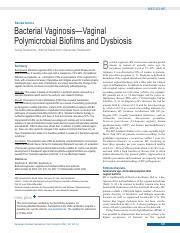Intro
Discover 5 ways to avoid Bacterial Vaginosis (BV) naturally, preventing symptoms like discharge and odor, while promoting vaginal health and balance with probiotics, diet, and hygiene practices.
Bacterial vaginosis, commonly referred to as BV, is a bacterial infection that occurs in the vagina, causing an imbalance in the natural bacterial flora. This condition is characterized by an overgrowth of harmful bacteria, leading to symptoms such as abnormal vaginal discharge, odor, and sometimes discomfort. Understanding how to prevent or avoid BV is crucial for maintaining vaginal health and overall well-being.
The importance of addressing BV lies in its potential to lead to more serious health issues if left untreated, including increased susceptibility to sexually transmitted infections (STIs) and complications during pregnancy. Moreover, the recurring nature of BV in some individuals underscores the need for proactive measures to prevent its occurrence. By adopting certain lifestyle changes and hygiene practices, individuals can significantly reduce their risk of developing BV.
Preventing BV requires a combination of good hygiene practices, a balanced diet, and a healthy lifestyle. While it's not possible to completely eliminate the risk, there are several strategies that can help in avoiding BV. These include maintaining good vaginal hygiene, wearing breathable clothing, practicing safe sex, managing stress, and ensuring a balanced diet rich in probiotics and essential nutrients. Each of these strategies plays a crucial role in maintaining the natural balance of vaginal flora and preventing the overgrowth of harmful bacteria.
Understanding Bacterial Vaginosis

Causes and Risk Factors
The causes and risk factors of BV are diverse and can include anything from hygiene practices to sexual activity. Understanding these factors is crucial for preventing the condition. Some of the key risk factors include: - Douching: This practice can disrupt the natural balance of bacteria in the vagina. - Multiple sexual partners: Having multiple partners can increase the risk of acquiring harmful bacteria. - Poor hygiene: Not practicing good hygiene can lead to bacterial imbalances. - Use of scented soaps or bubble baths: These can irritate the vagina and disrupt its natural flora. - Smoking: Smoking can affect the immune system and increase the risk of infections.Prevention Strategies

Importance of Probiotics
Probiotics play a crucial role in maintaining vaginal health by supporting the growth of beneficial bacteria. They can be found in fermented foods such as yogurt, kefir, and sauerkraut, or taken as supplements. Probiotics help in: - Maintaining the natural pH balance of the vagina. - Preventing the overgrowth of harmful bacteria. - Enhancing the immune system to fight off infections.Treatment Options

Home Remedies and Self-Care
Besides medical treatment, there are several home remedies and self-care practices that can help alleviate the symptoms of BV and support recovery: - Applying cold compresses to reduce discomfort. - Wearing cotton underwear to keep the genital area dry. - Avoiding irritants such as scented soaps or bubble baths. - Practicing good hygiene and drying the genital area thoroughly after bathing.Conclusion and Future Directions

Final Thoughts
Maintaining vaginal health is essential for overall well-being. By being proactive and adopting healthy lifestyle choices, individuals can protect themselves against BV and other vaginal infections. It's also crucial to seek medical advice if symptoms persist or recur, as untreated BV can lead to more serious health complications.What are the common symptoms of BV?
+The common symptoms of BV include abnormal vaginal discharge, which may have a strong, fishy odor, and sometimes discomfort or irritation in the genital area.
Can BV be treated with over-the-counter medications?
+No, BV requires a prescription antibiotic from a healthcare provider. Over-the-counter treatments are not effective for BV and may even worsen the condition.
How can I prevent BV from recurring?
+To prevent BV from recurring, practice good hygiene, wear breathable clothing, use condoms during sex, manage stress, and consider taking probiotics to support vaginal health.
We hope this comprehensive guide has provided you with valuable insights into avoiding BV and maintaining good vaginal health. Remember, prevention and early treatment are key to avoiding the complications associated with BV. If you have any further questions or would like to share your experiences with BV prevention and treatment, please feel free to comment below. Sharing this article with others can also help spread awareness and support the health and well-being of those around you.
